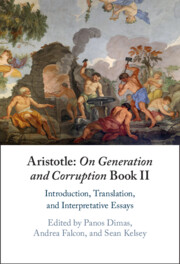 Aristotle: On Generation and Corruption Book II
Aristotle: On Generation and Corruption Book II Book contents
- Aristotle: On Generation and Corruption Book II
- Aristotle: On Generation and Corruption Book II
- Copyright page
- Contents
- Figures
- Tables
- Notes on Contributors
- Preface
- Abbreviations
- Part I Introduction and Interpretative Essays
- 1 On Generation and Corruption II
- 2 On Generation and Corruption II 1
- 3 On Generation and Corruption II 2
- 4 On Generation and Corruption II 3
- 5 On Generation and Corruption II 4
- 6 On Generation and Corruption II 5
- 7 On Generation and Corruption II 6
- 8 On Generation and Corruption II 7
- 9 On Generation and Corruption II 8
- 10 On Generation and Corruption II 9
- 11 On Generation and Corruption II 10
- 12 On Generation and Corruption II 11
- Part II Translation
- References
- Subject Index
- Index of Passages
4 - On Generation and Corruption II 3
from Part I - Introduction and Interpretative Essays
Published online by Cambridge University Press: 10 November 2022
- Aristotle: On Generation and Corruption Book II
- Aristotle: On Generation and Corruption Book II
- Copyright page
- Contents
- Figures
- Tables
- Notes on Contributors
- Preface
- Abbreviations
- Part I Introduction and Interpretative Essays
- 1 On Generation and Corruption II
- 2 On Generation and Corruption II 1
- 3 On Generation and Corruption II 2
- 4 On Generation and Corruption II 3
- 5 On Generation and Corruption II 4
- 6 On Generation and Corruption II 5
- 7 On Generation and Corruption II 6
- 8 On Generation and Corruption II 7
- 9 On Generation and Corruption II 8
- 10 On Generation and Corruption II 9
- 11 On Generation and Corruption II 10
- 12 On Generation and Corruption II 11
- Part II Translation
- References
- Subject Index
- Index of Passages
Summary
In GC II 3, Aristotle gives an initial justification of three theses: (i) that there are four primary bodies; (ii) that these are earth, air, fire, and water; and (iii) that each is associated with two primary differentiae. Despite his laconic presentation, Aristotle offers an impressive variety of justifications for his main contentions: he appeals to combinatorial mathematics, to what is “in accordance with argument,” to empirical observation, and to his predecessors. I consider whether this chapter indicates that the primary bodies are not really elements; whether the “apparent simple bodies” Aristotle mentions are the primary bodies or something else; and how to understand the “fiery” and “airy” things that are not fire and air (respectively) but somehow like them. I find that the primary bodies are indeed genuine elements of sensible bodies for Aristotle; that the “apparent simple bodies” are the everyday counterparts of the elemental bodies; and that the contrast between fiery and airy things and fire and air is a contrast between the elemental bodies and their everyday counterparts.
- Type
- Chapter
- Information
- Aristotle: On Generation and Corruption Book IIIntroduction, Translation, and Interpretative Essays, pp. 59 - 78Publisher: Cambridge University PressPrint publication year: 2022


